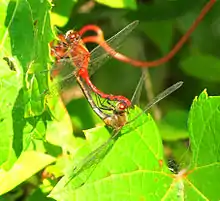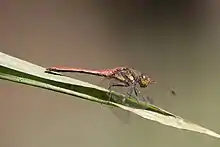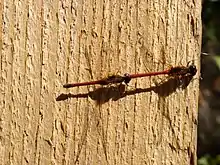| Darters or Meadowhawks | |
|---|---|
 | |
| Sympetrum fonscolombii | |
 | |
| White-faced Meadowhawks (Sympetrum obtrusum) in "wheel position", Shirleys Bay, Ottawa | |
| Scientific classification | |
| Domain: | Eukaryota |
| Kingdom: | Animalia |
| Phylum: | Arthropoda |
| Class: | Insecta |
| Order: | Odonata |
| Infraorder: | Anisoptera |
| Family: | Libellulidae |
| Subfamily: | Sympetrinae |
| Genus: | Sympetrum Newman, 1833 |

Sympetrum commixtum, Nepal

Sympetrum vicinum mating
Sympetrum is a genus of small to medium-sized skimmer dragonflies, known as darters in the UK and as meadowhawks in North America. The more than 50 species predominantly live in the temperate zone of the Northern Hemisphere; 15 species are native to North America. No Sympetrum species is native to Australia.
Most North American darters fly in late summer and autumn, breeding in ponds and foraging over meadows. Commonly, they are yellow-gold as juveniles, with mature males and some females becoming bright red on part or all of their bodies. An exception to this color scheme is the black darter (Sympetrum danae).[1]
The genus includes the following species:[2]
- Sympetrum ambiguum (Rambur, 1842) – blue-faced meadowhawk[3]
- Sympetrum anomalum Needham, 1930
- Sympetrum arenicolor Jödicke, 1994
- Sympetrum baccha (Selys, 1884)
- Sympetrum chaconi De Marmels, 1994
- Sympetrum commixtum (Selys, 1884)
- Sympetrum cordulegaster (Selys, 1883)
- Sympetrum corruptum (Hagen, 1861) – variegated meadowhawk[3]
- Sympetrum costiferum (Hagen, 1861) – saffron-winged meadowhawk[3]
- Sympetrum croceolum (Selys, 1883)
- Sympetrum daliensis Zhu, 1999
- Sympetrum danae (Sulzer, 1776) – black darter,[4] black meadowhawk[3]
- Sympetrum darwinianum Selys, 1883
- Sympetrum depressiusculum (Selys, 1841) – spotted darter[5]
- Sympetrum dilatatum (Calvert, 1892) – St. Helena darter[6]
- Sympetrum durum Bartenev, 1916
- Sympetrum eroticum (Selys, 1883)
- Sympetrum evanescens De Marmels, 1992
- Sympetrum flaveolum (Linnaeus, 1758) – yellow-winged darter[4]
- Sympetrum fonscolombii (Selys, 1840) – red-veined darter,[4] nomad[7]
- Sympetrum frequens (Selys, 1883)[8]
- Sympetrum gilvum (Selys, 1884)
- Sympetrum gracile Oguma, 1915
- Sympetrum haematoneura Fraser, 1924
- Sympetrum haritonovi Borisov, 1983 – dwarf darter[9]
- Sympetrum himalayanum Navás, 1934
- Sympetrum hypomelas (Selys, 1884)
- Sympetrum illotum (Hagen, 1861) – cardinal meadowhawk[3]
- Sympetrum imitans (Selys, 1886)
- Sympetrum infuscatum (Selys, 1883)
- Sympetrum internum Montgomery, 1943 – cherry-faced meadowhawk[3]
- Sympetrum kunckeli (Selys, 1884)
- Sympetrum maculatum Oguma, 1922
- Sympetrum madidum (Hagen, 1861) – red-veined meadowhawk[3]
- Sympetrum meridionale (Selys, 1841) – southern darter[5]
- Sympetrum nigrifemur (Selys, 1884) – island darter[10]
- Sympetrum nigrocreatum Calvert, 1920 – Talamanca meadowhawk[11]
- Sympetrum nomurai Asahina, 1997
- Sympetrum obtrusum (Hagen, 1861) – white-faced meadowhawk[3]
- Sympetrum orientale (Selys, 1883)
- Sympetrum pallipes (Hagen, 1874) – striped meadowhawk[3]
- Sympetrum paramo De Marmels, 2001
- Sympetrum parvulum (Bartenev, 1912)
- Sympetrum pedemontanum (Müller, 1766) – banded darter[4]
- Sympetrum risi Bartenev, 1914
- Sympetrum roraimae De Marmels, 1988
- Sympetrum rubicundulum (Say, 1840) – ruby meadowhawk[3]
- Sympetrum ruptum Needham, 1930
- Sympetrum sanguineum (Müller, 1764) – ruddy darter[4]
- Sympetrum semicinctum (Say, 1840) – band-winged meadowhawk[3]
- Sympetrum signiferum Cannings & Garrison, 1991
- Sympetrum sinaiticum Dumont, 1977 – desert darter[5]
- Sympetrum speciosum Oguma, 1915
- Sympetrum striolatum (Charpentier, 1840) – common darter[4]
- Sympetrum tibiale (Ris, 1897)
- Sympetrum uniforme (Selys, 1883)
- Sympetrum verum Bartenev, 1916
- Sympetrum vicinum (Hagen, 1861) – yellow-legged meadowhawk,[12] autumn meadowhawk[3]
- Sympetrum villosum Ris, 1911
- Sympetrum vulgatum (Linnaeus, 1758) – vagrant darter,[4] moustached darter[5]
- Sympetrum xiaoi Han & Zhu, 1997
References
- ↑ Needham, James G.; Minter J. Westfall Jr.; Michael L. May (2000). Dragonflies of North America (rev. ed.). Gainesville, FL: Scientific Publishers. p. 795. ISBN 0-945417-94-2.
- ↑ Paulson, D.; Schorr, M.; Abbott, J.; Bota-Sierra, C.; Deliry, C.; Dijkstra, K.-D.; Lozano, F. (2023). "World Odonata List". OdonataCentral, University of Alabama. Retrieved 14 March 2023.
- 1 2 3 4 5 6 7 8 9 10 11 12 "North American Odonata". University of Puget Sound. 2009. Retrieved 5 August 2010.
- 1 2 3 4 5 6 7 "Checklist of UK Species". British Dragonfly Society. Retrieved 5 August 2010.
- 1 2 3 4 "Checklist, English common names". DragonflyPix.com. Archived from the original on 4 December 2012. Retrieved 5 August 2010.
- ↑ Suhling, F. & Martens, A. (2011). "Sympetrum dilatatum". IUCN Red List of Threatened Species. 2011: e.T21226A9259879. doi:10.2305/IUCN.UK.2011-1.RLTS.T21226A9259879.en.
- ↑ Samways, Michael J. (2008). Dragonflies and damselflies of South Africa (1st ed.). Sofia: Pensoft. ISBN 978-9546423306.
- ↑ Autumn Darter, Kochi
- ↑ Clausnitzer, V. (2009). "Sympetrum haritonovi". IUCN Red List of Threatened Species. 2009: e.T158697A5261939. doi:10.2305/IUCN.UK.2009-2.RLTS.T158697A5261939.en.
- ↑ Clausnitzer, V.; Kalkman, V.J. (2020). "Sympetrum nigrifemur". IUCN Red List of Threatened Species. 2020: e.T60292A140601430. doi:10.2305/IUCN.UK.2020-3.RLTS.T60292A140601430.en.
- ↑ Paulson, D. R. (2009). "Sympetrum nigrocreatum". IUCN Red List of Threatened Species. 2009: e.T164924A5939416. doi:10.2305/IUCN.UK.2009-2.RLTS.T164924A5939416.en.
- ↑ Dunkle, S. W. (2000). Dragonflies through Binoculars. OUP.
External links
 Media related to Sympetrum at Wikimedia Commons
Media related to Sympetrum at Wikimedia Commons
This article is issued from Wikipedia. The text is licensed under Creative Commons - Attribution - Sharealike. Additional terms may apply for the media files.